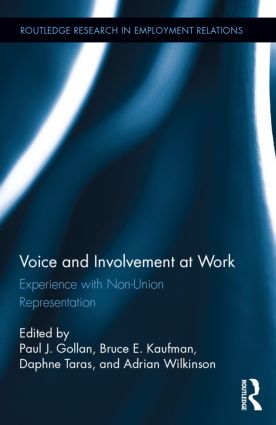Book Review: Voice and Involvement at Work: Experience with Non-Union Representation

Voice and Involvement at Work: Experience with Non-Union Representation. Edited by Paul J. Gollan, Bruce E. Kaufman, Daphne Taras, Adrian Wilkinson . New York and Oxford: Routledge, 2015. 420 pp. ISBN 978-0-415-53721-6, $135 (Cloth).
Rafael Gomez of University of Toronto recently took the time to review the book in the October Issue of ILR Review, which you can find here. From the review:
The editors spend a considerable amount of time in the introductory chapter not just laying out the structure of the book and offering a redacted synopsis for the time-constrained reviewer, but in really fleshing out where NER [non-union employee representation] sits in relation to the human resource management (HRM), economics, and industrial relations literatures. This chapter also offers arguably one of the strongest defenses of why we should be interested in NER and for abandoning many preconceived notions of what NER does. For too long, as the editors note, employee representation schemes that were either mandated (much work has existed on the rise of statutory works councils, for example) or set up by an employer were deemed to be of second order significance and/or lacked legitimacy in some quarters of the IR discipline. Likewise in the HRM literature, an
overriding concern was on the bottom-line impact of such schemes and how they linked up to the broader high-performance paradigm. The editors quite rightly point to the real intrinsic value of providing voice to workers (free from any associated efficiency benefits) and how workplaces should still be viewed, by implication, as the crucibles of industrial democracy. The other perspective of course that is given short shrift by the editors is the view held among many traditional labor studies scholars that NER is everywhere and always a trade union substitute. This is indeed one of the motives behind some employer NER designs—the editors acknowledge as much—but equal precedence can be found for seeing NER systems as platforms for employee engagement and eventual trade union representation.
You can read the rest of the review from ILR Review for free for the next two weeks by clicking here. Like what you read? Click here to sign up for e-alerts and have all the latest research and reviews like this sent directly to your inbox!































































































